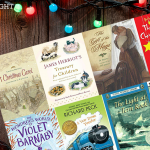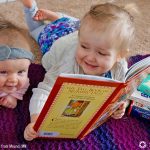I've been thinking lately about the future of books.
Obviously, I don't know what the future holds. What I do know are a few reasons why physical, paper books are such critical treasures for children and adults alike.
You probably know how much I value time spent reading aloud to children. There's nothing like the affirming physical touch, emotional maturation, and intellectual discovery that occurs when you snuggle up with your children for a gripping Read-Aloud. Even if your little ones are playing or drawing quietly on the floor while you read (so their hands are busy even as their minds engage in the story), these are precious times with manifold rewards.
One of the extra rewards of reading aloud is that reading trains children to stay focused on one task and ignore potential interruptions until they complete the task. When you read, there is nothing to do but focus on the story and keep going. You might break off into discussions and questions as you progress, but you come back to the story and keep moving forward. There is a definite end in sight. As you flip the pages, you continually see how you're progressing toward that end, and you arrive at a clear ending. Then, depending on your style, you get the satisfaction of checking the box in your IG, crossing the book off a list or adding the title to your ever growing list of books you've read.
Consider an alternative: instead of sitting down to read a book about the American Civil War, you log on to your computer and look up the Wikipedia article on the Civil War. You can certainly read and learn from the online article. But every paragraph (even the first sentence!) contains so many links to other interesting topics, names and events that, chances are, you'll click through to something else before you read one whole section of the original article. Then you see five more interesting links and before you know it, you’ve started down a dozen different paths of learning and come out with some interesting bits of trivia (Did you know that many of the earliest Northern histories of the war called it the "War of the Rebellion"?), but no cohesive or comprehensive understanding of the war's context.
There certainly are advantages to online learning. How great that we can satisfy our curiosity immediately. But if this approach represents the majority of how we learn, we slowly train ourselves (and our children) to think in scattered, non-linear patterns.
Reading a real biography or novel takes you away from electronic distractions and trains you to be satisfied with what you have in hand, instead of chasing the endless resources available online. Once you go online to read something, there is simply no definable "end." You can click links and read more forever. But books train children to start something and carry it through to completion. Could there be an easier or more effective way to encourage and reward this focused completion of a task from start to finish? The sense of satisfaction that comes with finishing a good book encourages children to develop the habit of following through on tasks for the rest of their lives.
That’s just one reason why I love the stories I hear from moms whose children have just discovered that they can read a whole book on their own. (I often hear this about the I Can Read It series.) As children learn to do this repeatedly, they reinforce the lesson that they can take on challenges and complete them. One page at a time.
So while I'm excited about some of the opportunities available as our society becomes increasingly internet-dependent, may it be that in twenty years, we still value the treasure of sitting down to read (and finish) a good book.
Blessings on you and yours,
Sarita






